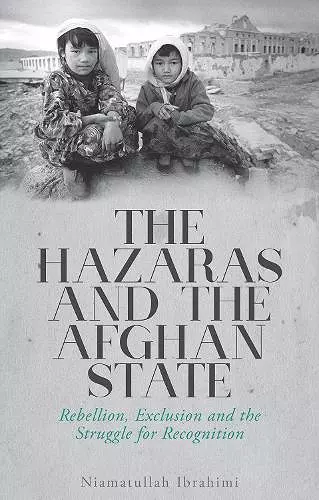The Hazaras and the Afghan State
Rebellion, Exclusion and the Struggle for Recognition
Format:Paperback
Publisher:C Hurst & Co Publishers Ltd
Published:2nd Jun '22
Should be back in stock very soon
This paperback is available in another edition too:
- Hardback£40.00(9781849047074)

The Hazaras of Afghanistan have borne the brunt of many of the destructive forces unleashed by the establishment of the Afghan monarchy in 1747. The history of their relationship with the Afghan state has been punctuated by frequent episodes of ethnic cleansing, mass dispossession, forced displacement, enslavement and social and economic exclusion. Mostly Shia in a country dominated by Sunni Muslims, and identifiable because of their Asian features, the Hazaras became Afghanistan's internal 'Other'. They look different and practise a different school of Islam in a country that is prone to internal conflict and the machinations of external powers. The history of the Hazaras therefore offers a unique perspective into the deep contradictions of Afghanistan as a modern state, and how its ethnic and religious dynamics continue to undermine the post-2001 political process. This volume provides a fresh account of both the strategies and tactics of the Afghan state and how the Hazaras have responded to them, focusing on three key phenomena: Hazara rebellion and resistance to the intrusion of the Afghan state in the nineteenth century; the incorporation of the Hazara homeland into Afghanistan in the 1890s and their subsequent marginalisation and exclusion; and the Hazaras' ethnic mobilisation and struggle for recognition in recent decades.
'Ibrahimi's impressively detailed history helps us to make sense of the current political situation in Afghanistan ... throughout the book Ibrahimi adopts a healthy critical stance towards essentialist theories of ethnicity. He aptly shows that to get a full picture of Afghan politics it is necessary to both zoom out to the global and transnational level, and zoom in below the provincial level.' -- The Times Literary Supplement
Niamatullah Ibrahimi's richly-textured account of Hazaras' relations with the Afghan state not only sheds light on the social and political complexities of a highly-vulnerable group; it also illuminates dimensions of the state building enterprise in Afghanistan in ways that highlight the challenges of internationally-supported state building more broadly. A pathbreaking book. -- William Maley, Professor of Diplomacy in the Asia-Pacific College of Diplomacy at the Australian National University; author of 'What is a Refugee?' and 'Reconstructing Afghanistan: Civil-Military Experiences in Comparative Perspective'
'In this this sympathetic but nonpolemic book . . . Ibrahimi has undertaken field and archival research to trace the efforts of the Hazaras to protect their identity and patrimony and to find a legitimate place in the Afghan state.'
'An excellent forensic survey.'
A work of great interest, which skilfully examines the link between nation-state formation since the late nineteenth century and the politicisation of ethnic identities. Focusing on the case of the Hazaras, Ibrahimi demonstrates how ethnicity, far from being a primordial form of social organisation, became an idiom of political mobilisation. -- Alessandro Monsutti, Graduate Institute of International and Development Studies, Geneva; author of 'War and Migration: Social Networks and Economic Strategies of the Hazaras of Afghanistan'
Ibrahimi vividly relates the history of the long persecuted Hazara minority, unravelling their relations with the Afghan state for over two centuries, their complex internal political rivalries, the role of foreign interventions, and their recent successes in an on-going struggle for recognition. It is a bloody, tragic, but often inspiring story. -- Richard Tapper, Emeritus Professor of Anthropology in the University of London
Ibrahimi evaluates the costs in the creation of modern nation-states in multiethnic societies by narrating the sufferings of one group, the Hazaras, in the making of Afghanistan. A must-read for political analysts, policy makers and those wishing to understand why failed multiethnic nation-states provoke politics of rage and extremism in the region. -- Nazif M. Shahrani, Professor of Anthropology, Central Asian and Middle Eastern Studies, Indiana University
ISBN: 9781787387744
Dimensions: unknown
Weight: unknown
288 pages